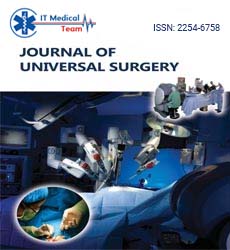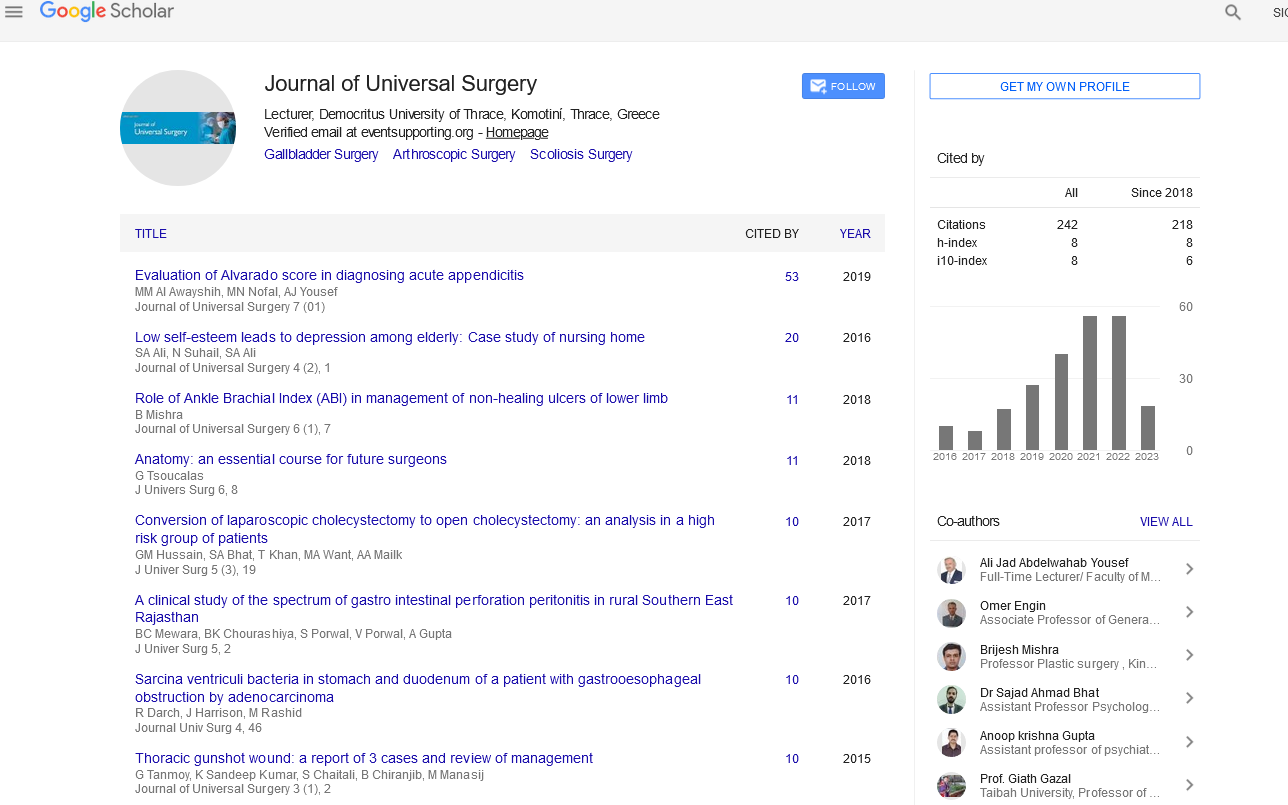Perspective - (2024) Volume 12, Issue 1
Colorectal Surgery: Enhanced Patient Outcomes
Jin Saka*
Department of General Surgeon, University of Otoineppu, Otoineppu, Japan
*Correspondence:
Jin Saka, Department of General Surgeon, University of Otoineppu, Otoineppu,
Japan,
Email:
Received: 16-Jan-2024, Manuscript No. IPJUS-24-14548;
Editor assigned: 19-Jan-2024, Pre QC No. IPJUS-24-14548 (PQ);
Reviewed: 02-Feb-2024, QC No. IPJUS-24-14548;
Revised: 20-Feb-2024, Manuscript No. IPJUS-24-14548 (R);
Published:
27-Feb-2024
Introduction
Colorectal surgery has undergone remarkable advancements
in recent years, revolutionizing treatment options for various
colorectal conditions. From innovative surgical techniques to
cutting-edge technology, the field has evolved to prioritize
patient outcomes, minimize invasiveness, and expedite recovery.
In this article, we explore the latest trends and breakthroughs in
colorectal surgery, shedding light on how these advancements
are reshaping the landscape of medical care for individuals with
colorectal disorders.
Description
The evolution of colorectal surgery
Colorectal surgery has a rich history marked by significant
milestones. Traditionally, open surgery was the primary
approach for treating colorectal conditions, requiring large
incisions and prolonged hospital stays. However, with the advent
of minimally invasive techniques such as laparoscopy and
robotic-assisted surgery, the field experienced a paradigm shift.
These approaches utilize small incisions, specialized instruments,
and advanced imaging systems, offering patients several
benefits including reduced pain, shorter hospital stays, and
faster recovery times.
Robotic-assisted colorectal surgery: Precision and
dexterity
Robotic-assisted surgery has emerged as a game-changer in
the field of colorectal surgery. With robotic platforms like the da
Vinci surgical system, surgeons can perform complex procedures
with enhanced precision and dexterity. The system's highdefinition
3D visualization and wristed instruments enable
surgeons to navigate tight spaces within the abdomen with
greater accuracy, minimizing trauma to surrounding tissues and
organs. Moreover, the ergonomic design of the console allows
surgeons to operate comfortably for extended periods, reducing
fatigue and improving overall surgical outcomes.
One of the key advantages of robotic-assisted colorectal
surgery is its ability to overcome the limitations of traditional
laparoscopy, particularly in cases involving intricate maneuvers
or difficult-to-reach areas. Surgeons can manipulate the robotic arms with utmost precision, performing tasks that would be
challenging or impossible with conventional laparoscopic
instruments. As a result, patients undergoing robotic-assisted
procedures often experience reduced blood loss, lower
complication rates, and faster recovery compared to traditional
open surgery.
Enhanced Recovery After Surgery (ERAS) protocols
In addition to technological advancements, the
implementation of Enhanced Recovery After Surgery (ERAS)
protocols has significantly improved patient outcomes in
colorectal surgery. ERAS protocols consist of evidence-based
interventions aimed at optimizing perioperative care and
accelerating postoperative recovery. These interventions
encompass various aspects of patient management, including
preoperative counseling, multimodal pain management, early
mobilization, and nutrition optimization.
By employing a multidisciplinary approach and focusing on
proactive perioperative care, ERAS protocols help minimize
surgical stress, reduce complications, and enhance overall
patient satisfaction. For instance, preoperative education and
counseling empower patients to actively participate in their
care, leading to better adherence to postoperative instructions
and improved outcomes. Similarly, multimodal pain
management strategies, such as the use of regional anesthesia
and non-opioid analgesics, contribute to reduced opioid
consumption, faster bowel recovery, and shorter hospital stays.
Furthermore, early mobilization and ambulation play a crucial
role in preventing postoperative complications such as
thromboembolism and respiratory infections. By encouraging
patients to engage in physical activity soon after surgery, ERAS
protocols promote faster recovery of gastrointestinal function
and expedite return to normal activities. Additionally, nutritional
optimization strategies, including early oral intake and
personalized dietary plans, help mitigate the risk of malnutrition
and improve wound healing, further enhancing the overall
recovery process.
Navigating complex cases with multidisciplinary
collaboration
Colorectal surgery often involves the management of complex
cases, ranging from colorectal cancer to inflammatory bowel disease and pelvic floor disorders. In such scenarios,
multidisciplinary collaboration is essential to ensure
comprehensive patient care and optimal treatment outcomes.
Multidisciplinary teams comprising colorectal surgeons, medical
oncologists, radiation oncologists, gastroenterologists,
radiologists, and specialized nurses work together to develop
tailored treatment plans tailored to each patient's unique needs.
This collaborative approach facilitates interdisciplinary
consultations, allowing experts from different specialties to
share their insights and expertise. For instance, in the case of
colorectal cancer, multidisciplinary tumor boards review
diagnostic imaging studies, pathology reports, and treatment
options to determine the most appropriate course of action.
Similarly, in the management of inflammatory bowel disease,
collaborative efforts between colorectal surgeons and
gastroenterologists help optimize medical therapy, minimize
disease activity, and improve long-term outcomes.
Moreover, multidisciplinary teams play a crucial role in the
implementation of advanced techniques such as Transanal Total
Mesorectal Excision (TaTME) for rectal cancer. TaTME combines
laparoscopic and transanal approaches to achieve complete
mesorectal excision with enhanced precision and visualization.
By leveraging the expertise of colorectal surgeons and
proctologists, TaTME allows for improved sphincter preservation
and oncological outcomes in select patients with mid-to-low
rectal cancer.
Future directions and innovations in colorectal
surgery
Looking ahead, the field of colorectal surgery continues to
evolve with ongoing research, technological innovations, and clinical trials. Emerging trends include the integration of Artificial
Intelligence (AI) and machine learning algorithms for
preoperative risk stratification, intraoperative decision support,
and postoperative outcome prediction. AI-powered imaging
techniques, such as radiomics and computer-aided diagnostics,
hold promise for early detection of colorectal lesions and
accurate staging of malignancies.
Furthermore, advancements in surgical navigation systems
and augmented reality technologies are poised to enhance
surgical precision and intraoperative guidance. Real-time
navigation platforms provide surgeons with interactive 3D maps
of the surgical field, enabling precise localization of tumors,
identification of critical structures, and optimal instrument
placement. Augmented reality overlays enhance visualization by
superimposing digital images onto the surgical field, facilitating
intuitive navigation and anatomical orientation during complex
procedures.
Conclusion
In conclusion, colorectal surgery has witnessed remarkable
advancements in recent years, driven by technological
innovation, evidence-based practices, and multidisciplinary
collaboration. From robotic-assisted techniques to enhanced
recovery protocols and personalized treatment approaches,
these advancements have transformed the landscape of
colorectal care, offering patients improved outcomes, reduced
morbidity, and enhanced quality of life. As the field continues to
evolve, embracing emerging technologies and fostering
interdisciplinary partnerships will be key to further enhancing
patient care and shaping the future of colorectal surgery.
Citation: Saka J (2024) Colorectal Surgery: Enhanced Patient Outcomes. J Univ Surg Vol.12 No.1: 001





